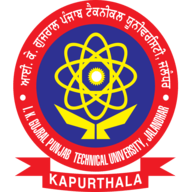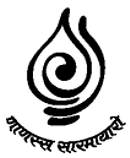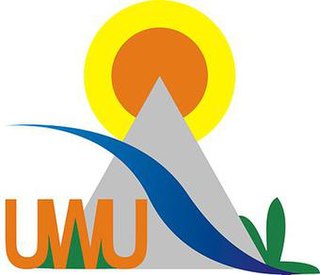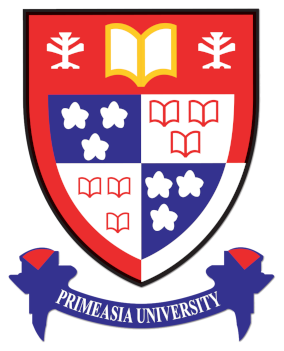
Bachelor of Arts is a bachelor's degree awarded for an undergraduate program in the arts, or, in some cases, other disciplines. A Bachelor of Arts degree course is generally completed in three or four years, depending on the country and institution.
A bachelor's degree or baccalaureate is an undergraduate academic degree awarded by colleges and universities upon completion of a course of study lasting three to six years. The two most common bachelor's degrees are the Bachelor of Arts (BA) and the Bachelor of Science. In some institutions and educational systems, certain bachelor's degrees can only be taken as graduate or postgraduate educations after a first degree has been completed, although more commonly the successful completion of a bachelor's degree is a prerequisite for further courses such as a master's or a doctorate.

A Master of Science is a master's degree in the field of science awarded by universities in many countries or a person holding such a degree. In contrast to the Master of Arts degree, the Master of Science degree is typically granted for studies in sciences, engineering and medicine and is usually for programs that are more focused on scientific and mathematical subjects; however, different universities have different conventions and may also offer the degree for fields typically considered within the humanities and social sciences. While it ultimately depends upon the specific program, earning a Master of Science degree typically includes writing a thesis.

St. Albert's College is an autonomous liberal arts college located at Kochi, India. It has twenty three degree courses, twelve postgraduate courses and seven research centres. The National Assessment and Accreditation Council (NAAC) has accredited the college at the "A" level with an aggregate score of 3.24. St. Albert's College (Autonomous) was ranked as one among the best hundred autonomous colleges in India.
Karnataka Veterinary, Animal and Fisheries Sciences University abbreviated as KVAFSU is a public university, established by an Act of Karnataka Legislative Assembly which was passed on 10 February 2004. This university has its headquarters in the Bidar district of Karnataka state, India.
A Bachelor of Pharmacy is a graduate academic degree in the field of pharmacy. In many countries, this degree is a prerequisite for registration to practice as a pharmacist. Since both PharmB and PharmD are prerequisites to license in most western countries they're considered equivalent. In many western countries, the foreign graduates with BPharm, PharmB or BS Pharm practice similarly as PharmD graduates. It is analogous to MBBS vs. MD where MBBS is foreign equivalent of MD. It is training to understand the properties and impacts of medicines and developing the skills required to counsel patients about their use.

I. K. Gujral Punjab Technical University (IKGPTU), formerly Punjab Technical University (PTU), is a State university located by Kapurthala highway in Kapurthala, India. It was established by an act of State Legislature on 16 January 1997, to promote technical, management and pharmaceutical education in the state of Punjab at the degree level and above. Being an education and research university, it has a mandate to set up centres of excellence in emerging technologies for promoting training and research and development in these areas.

Buxi Jagabandhu Bidyadhar Autonomous College, better known as BJB Autonomous College, is a college in Bhubaneswar in Odisha, India that offers courses at primarily the higher secondary and undergraduate levels.
Education for librarianship, including for paraprofessional library workers, varies around the world, and has changed over time. In recent decades, many institutions offering librarianship education have changed their names to reflect the shift from print media to electronic media, and to information contained outside of traditional libraries. Some call themselves schools of library and information science, or have dropped the word "library" altogether.
The Bologna process for standardisation of European higher education specified an undergraduate degree of at least three years called the "licence" or bachelor's degree, followed by a two-year diploma called the master's degree, then a doctorate, meant to be obtained in at least three years. Because of these indicated schedules, the reform is sometimes (erroneously) referred to as "3-5-8". The system applies to the European Higher Education Area.
The Bachelor of Applied Arts and Sciences, often abbreviated as BAAS or BAASc, is an undergraduate degree.

Dhaka University of Engineering & Technology, Gazipur or DUET is a public university in Gazipur, Bangladesh which focuses on the study of engineering and architecture. It is one of the nine PhD granting research universities of Bangladesh.

Jain Vishva Bharati Institute is a deemed university in Rajasthan.

Rajarata University of Sri Lanka is a public university located in the historic city of Mihintale, near Anuradhapura, Sri Lanka. The Rajarata University of Sri Lanka was established as the eleventh University in Sri Lanka and was opened on 31 January 1996 by President Chandrika Kumaratunga.

A Bachelor of Science is a bachelor's degree awarded for programs that generally last three to five years.
A Master of Science in Information Technology is a master's degree in the field of information technology awarded by universities in many countries or a person holding such a degree. The MSIT degree is designed for those managing information technology, especially the information systems development process. The MSIT degree is functionally equivalent to a Master of Information Systems Management, which is one of several specialized master's degree programs recognized by the Association to Advance Collegiate Schools of Business (AACSB). One can become software engineer and data scientist after completing M.Sc. IT.
A Bachelor of Science in Information Technology,, is a bachelor's degree awarded for an undergraduate program in the information technology. The degree is normally required in order to work in the Information technology industry.

Uva Wellassa University is a Sri Lankan national university. The university was established by government gazette effective 1 June 2005 in Badulla, Sri Lanka as the 14th national university of Sri Lanka. President Chandrika Kumaratunga established the university in 2007. The university was officially opened by Sri Lankan president Mahinda Rajapaksa on 5 August 2009. It is the first all-entrepreneurial university in Sri Lanka. It is designed to provide essential skills and broad general education for all students while providing the conceptual and methodological background and the training to obtain practical solutions for value addition to the national resources base of Sri Lanka.

Primeasia University is a private research university located in Dhaka, Bangladesh. It was established in 2003.
St. Paul's College, Kalamassery located at Kochi was founded by Joseph Attipetty, the late Archbishop of Verapoly to commemorate the historic visit of Pope Paul VI to India in connection with the 38th International Eucharistic Congress held in November - December 1964. The foundation stone of the college was blessed by the pope on 3 December 1964 and was solemnly laid by Samuel Mathai, the Vice-Chancellor of the University of Kerala in the presence of Joseph Attipetty on 13 February 1965. Out of his filial devotion to the Pope, the founder desired that the college be named after the Apostle Paul, the patron saint of the Pope.










